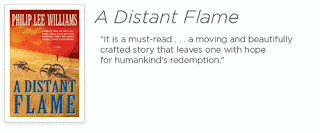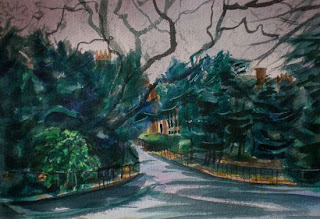 |
"Touched" by Clive Hicks-Jenkins
Cover and jacket image for The Throne of Psyche
(Mercer University Press, 2011) |
Time for an excerpt from
The Throne of Psyche: this passage is about halfway through the title poem. I thought maybe you needed a little drama, a little visit from Eros, a marriage of your Psyche-soul and Eros-body here at the start of the weekend...
The poem was originally published in
Mezzo Cammin.
III. THE MARRIAGE BED
And if the palace seemed bewitching, how
Much more the bed, a marvel of the gods—
Like nothing for an earthly king and queen,
A lustrous treasure box packed up in silks,
Four-legged, each leg a tree of ebony.
As shadows slid across the windowsills,
Collecting in the corners of the room,
The trees began to send out wands and leaves,
Darkening the air with gleaming branches.
Whoever saw such freedom from the laws
Of earth? I stared, forgot to tremble in
My wonder as new tendrils wove a maze
Above a bed that glistened, beetle-black.
Unseen hands drew dusk across the portal
And windows, carried off the glowing lamp,
And strewed fresh petals on the inlaid floor.
If this was how my promised husband’s house
Received his bride, perhaps the feathered snake
—for so Apollo’s oracle foretold—
Could be more beautiful than I had dreamed,
If flying terror could be beautiful.
Shade took the room until I could not see.
A mimic springtime blossomed on each branch
As tiny stars shone out, began to crawl
And sometimes blink like phosphorescent bugs.
I fell asleep and shinned the olive tree
That waxed inside my mother’s garden walls
And heard a crinkling of the leaves that spoke
Oracular to me of love and fate,
But where was dream and where the waking world
I hardly knew, and when the feathered snake
Came wooing with eternal promises,
I let him hold me in his arms that seemed
More like a man’s than like a serpent’s grasp.
Yet fear is strange: at times he seemed all scales
That snagged against the linen of my gown,
At times he seemed as yielding as a child.
I woke to find that what I dreamed was true—
The rustle of his wings was like the leaves,
The arms that pinned me close were like a man’s,
Although no man could emanate such fire,
A darkness glowing in the chamber’s pitch.
But what did I, long sheltered in my home,
Know of the ways of monsters or of men?
A tree of nerves sprang into trembling life
Inside this body that the world desired
But never knew—the starry insects swarmed
Among the maze of limbs and multiplied
Until the dark was pricked with flecks of light
That gave no seeing to my open eyes.
The snake kept winding on the tree of me—
I flashed with nervous fire from root to leaf
And shivered as my gown was tugged aside.
A rush of wood: new saplings broke the floor
And forested the chamber, wild with growth.
The room dissolved as floor was changed to earth
And roof transformed to sky and swarming stars.
In midnight’s wilderness my lover struck
Asunder all my childhood’s innocence—
The little stars went shrieking through the wood
As jet-black trees contracted, splintered, fell.
I lay within a nest of shattered twigs.
A shape with wings was sobbing on my breast,
Some wall between us battered down to dust.
I touched the face invisible to me.
His serpent pinions beat convulsively.
***Available via
Indie Store Finder (find an independent store near you),
Amazon, and other outlets, etc. We appear to be in the very end of the pre-order period.











































Why attempt to sink into a work of art when we are so very different (and better, surely) now? We're sex-friendly, so Bernini must have just been wanting to show the world a sexual image and plunk it down in the middle of Cardinal Cornaro's chosen burial site. As for Teresa of Avila, a mystical nun, and her precisely stated account of divine contact, what do we care whether it was a direct source for Bernini and accurately portrayed? What does that have to do with anything?
Anyway, I thought that "entering in" to a work of art is an important topic for people who love the arts and the achievements of our predecessors, so I am sharing my comment here. See below the picture for a link to the original article.
The critic says that some of the shots he included were stills
from Schama's Power of Art DVD--not sure whether this is one.
Judging by this thread, I would say that the secular eye and the religious eye are not seeing the same piece of art. Two world views, two versions.
The secular viewer is constrained to be reductive and perceive only sex. To use a proverb with a few sexual connotations of its own, “When you’re a hammer, all the world’s a nail.”
Meanwhile the religious viewer sees the sensuality of this bride of Christ, yes, but in the form of an utter abandon of the human body “slain in the spirit.”
Bernini was not a secular man but a Christian, and here he presents divine joy in a way utterly right for how St. Theresa described her mystic union with God. “The Ecstasy of St. Theresa” shines with his genius for bringing passionate life to stone and a thrilling ability to create dramatic architectural design as setting for his sculptural works.
A hallmark error of our era is to diminish the glories of the past in an effort to make them better “fit” our modern times and modern sensibilities. Not only is there a lack of sympathy for religious experience and transformation, but there is a determined and even self-righteous lack of imagination, which has already begun to close off the great works of past time from many secular viewers.